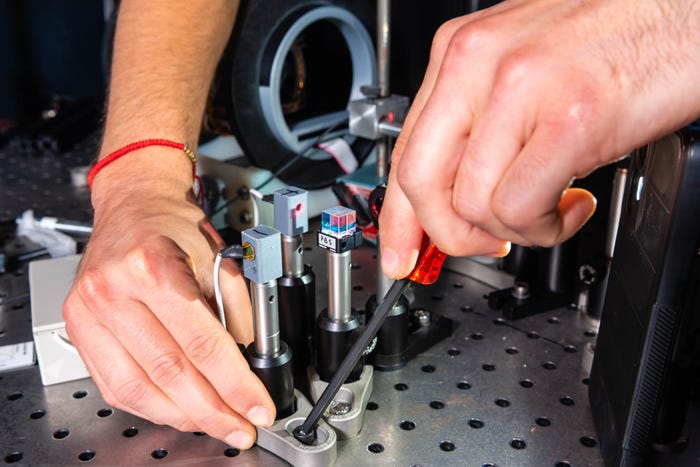
Connects decision-makers and solutions creators to what's next in quantum computing
Cambridge Consultants Prepares for Commercial Tipping Point of Quantum
Q&A with Cambridge Consultant’s James Cruise
December 4, 2023

Cambridge Consultants is part of Capgemini’s consulting group, Capgemini Invent. Associate director of quantum algorithms James Cruise heads up a forward-looking division that focuses on quantum algorithms, cloud and other emerging computing technologies.
In this Q&A, Cruise reviews what the U.K. government’s recently announced quantum missions mean for business, what 2024 holds for quantum advances and how organizations should prepare for quantum now.
Enter Quantum: What does Cambridge Consultants do?
James Cruise: We’re a tech consultancy across a huge range of businesses and backgrounds, including biology, chemistry and physics, and some advisory services in AI. Within that, we're always looking to build our capabilities and thinking what will the future needs of our clients be? How do we start to build that capability and service that clients will need in the future?
Quantum is one of those strategic technologies, both computing and technology in general. We have efforts in positioning and navigation, and in sensing, as well as on the algorithmic side. We see these as capabilities both as something to sell to our clients in the future, but also to support their capabilities.
We see ourselves as a big contributor in the quantum space because we know that it will change the way we do chemistry and physics, so we're building that capability, looking ahead, to say how do we do that? How do we help our most ambitious clients understand what quantum means for them, but also, what does it mean for us?

Cambridge Consultants works with a wide range of quantum technologies. Credit: Cambridge Consultants
The U.K. Government recently set out its five quantum missions as part of its autumn statement. What's Cambridge Consultants’ take on what it means for industry?
This is about giving certainty, but also enabling the U.K. to see itself as a major hub and player. They are all significantly ambitious targets – none of them are going to be easy to achieve. But if we get there with some of them, we will be world leaders in that aspect. It's a commitment from the government to support the industry and the ecosystem in making those drives forward.
We've already done some of our internal work around the supply chain in quantum technologies, and that needs to be built out to enable these. For the quantum computing aspects, we need to make sure that compute is accessible and the developers love using it. If we just have a big quantum computer with lots of qubits, error correction and all the other hardware features on it, if we haven't figured out how it's valuable to business, it will just be a giant paperweight. It's about understanding how it's going to provide that commercial societal benefit, which is going to be key to leveraging that technology.
As the hardware matures, will 2024 be a tipping point for commercial applications?
Quantum technologies are maturing at different rates. We will see some very exciting things coming out on the sensing, position and navigation side. As we move through 2024, we’ll start to see real commercial applications coming out – it's still early days, but it's little by little in the computing sector. We will see revolutionary changes, but I don't think we'll see the commercial value coming yet.
What projects are you working on?
We have confidentiality agreements, but we work with clients in the logistics and chemistry spaces. We’re a part of Capgemini, which has a large engagement in the financial service sector. As such we combine both deep technical knowledge and experience with a true understanding of the real commercial impact of the technology.
We ask what would a new capability do for them and then and only then look at what quantum computers and algorithms they need to deliver that new capability.
Being slightly agnostic here, quantum is exciting, but there are other technologies as well. We will also pull in things like new GPUs and AI to deliver that capability and help them roadmap out what they need to do from an organizational and technology perspective to enable them to get that value.
What should organizations be doing now to get quantum-ready?
You need to engage now to help the quantum industry engage with you. It only has so much capacity and the customer organizations that engage will drive their use cases. The additional value is that they will get to understand your system, which also gives you a better perspective of your needs and where you might benefit sooner in that space.
It’s also about being at the start of that experimentation and being surprised about the exciting value that we can drive out of quantum computing.
You May Also Like




